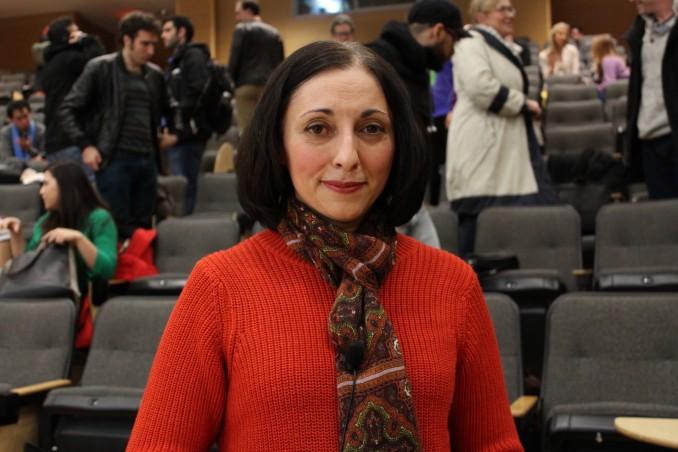By Caterina Amaral
Imprisoned at the age of 16, forced into marriage at 18 and moved to Canada at 26.
Marina Nemat told her story to the Ryerson community on Wednesday. She recounts how she was a political prisoner in Iran’s most notorious prison. She also spoke about how Iran’s future could change despite the oppressive regime instilled in 1979 during the Islamic Revolution.
She said in no way is she an academic. Instead Nemat calls herself a storyteller.
She was arrested in her home and later interrogated in Evin, a place she said is just north of Tehran and known for death and torture. At Evin a man asked her if she participated in rallies against the government.
“I thought about it for a moment. I have two options: I either lie [or] tell the truth. But what’s the point of lying? The principal knew I attended protest rallies, my friends knew, the shopkeepers knew. I didn’t wear a ski mask on the streets of Tehran. This was my own neighbourhood,” she said.
So Nemat admitted that she went to protest rallies.
Then he asked her if she had written articles against the government. She also admitted to that, but she said it was written on a piece of cardboard and more like anecdotes about the fact that “in my country having fun had become illegal.”
“So you tell a teenager they can’t have fun, what do you think they’re gonna do?”
To hear real life stories like Nemat’s is why third-year history student John Ceron was interested in attending Ryerson’s International Issues Discussion (IID) forum. Ceron said he read Nemat’s memoir, Prisoner of Tehran: A memoir. He said he enjoys reading non-fiction because “it gets you into the [real] world.”
After Nemat was in Evin for two years, she avoided execution when a guard told her they were going to get married or he would kill her parents. Later he was assassinated by a rival faction of the government. Nemat said his parents were good people and fought for her freedom. In 1991, she moved to Canada.
Host and organizer for IID, fourth-year history student Muna Osman said, “I really respected that [Nemat] said the future [of Iran] wasn’t definitive.”
Nemat said that in order for there to be change in Iran, everyone must hold accountability.
“We have to acknowledge all the things that we didn’t do and what we should have done and all the things we did. We have to acknowledge we are responsible,” she said.
Osman said she agrees with what Nemat said about change. Especially as a history student, Osman said she learned that intervention is not the only way to seek change but that it is from people’s initiatives.
Despite all the horrors Nemat endured in Evin, she said her most fond memories took place there. Nemat said she had friends who showed her love.
“That is humanity. When we love despite evil.”










Leave a Reply